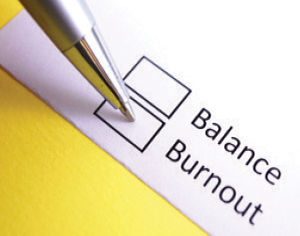Clinical Scenario
You are the program director of a mid-sized otolaryngology residency program. You feel it is important to keep a close eye on all aspects of residency training, especially the welfare of the residents and their patients. You have regular formal discussions with each of the residents about their progress, as well as infrequent, more personal discussions designed to listen to their thoughts and comments.
Explore This Issue
April 2017You find yourself increasingly concerned about the welfare of two of your residents—one a PGY-2 and the other a PGY-4. To different degrees, both of these young professionals are exhibiting subtle, but clear, changes in their personalities and work, including distancing themselves from their colleagues and faculty, showing signs of emotional exhaustion and physical tiredness, and exhibiting some lapses in the quality of their patient care.
When you bring up this issue at the next closed faculty meeting, you find that other faculty members have noticed the changes, but they express the opinion that perhaps the two residents are just going through a “phase.” Believing it may be more significant and serious than that, you plan to research the issue of burnout in residency training, especially for otolaryngology residents, before you develop a plan for discussing the collective faculty concerns with each of them.
How would you handle this case?
Discussion

© Yeexin Richelle / shutterStock.com
Over the past 15 years, physician burnout has become an increasingly recognized entity in the profession, with a growing literature base to reflect its importance. In a survey of surgeons, the American College of Surgeons identified, among the 7,905 respondents, a 40% burnout rate, a 30% positive screen for symptoms of depression, and a mental quality of life score one-half standard deviation below the population norm (Ann Surg. 2009;250:463–471). Numerous studies have confirmed this range of burnout over many specialties, both medical and surgical. Burnout occurs in both community practitioners and academic faculty alike, and it occurs in military physicians working in a high tempo combat deployment environment. Concerns about the effects of this level of physician burnout on patient care are clearly appropriate.
Burnout in physicians and surgeons is a response to multiple factors that can negatively impact their professional and personal lives, leading to emotional exhaustion/depletion, depersonalization, reduction in career satisfaction, and negative patient and non-patient personal interactions. Burnout may be a progressive process that waxes and wanes over the years, depending on the work and personal environments, but it may eventually lead physicians and surgeons to consider early retirement or a career change away from direct patient care. Quality-of-life issues with respect to work-personal balance can be caused by burnout as well as affected by this condition. In sum, burnout has come to the forefront as a major professional issue that needs to be recognized, understood, and mitigated.